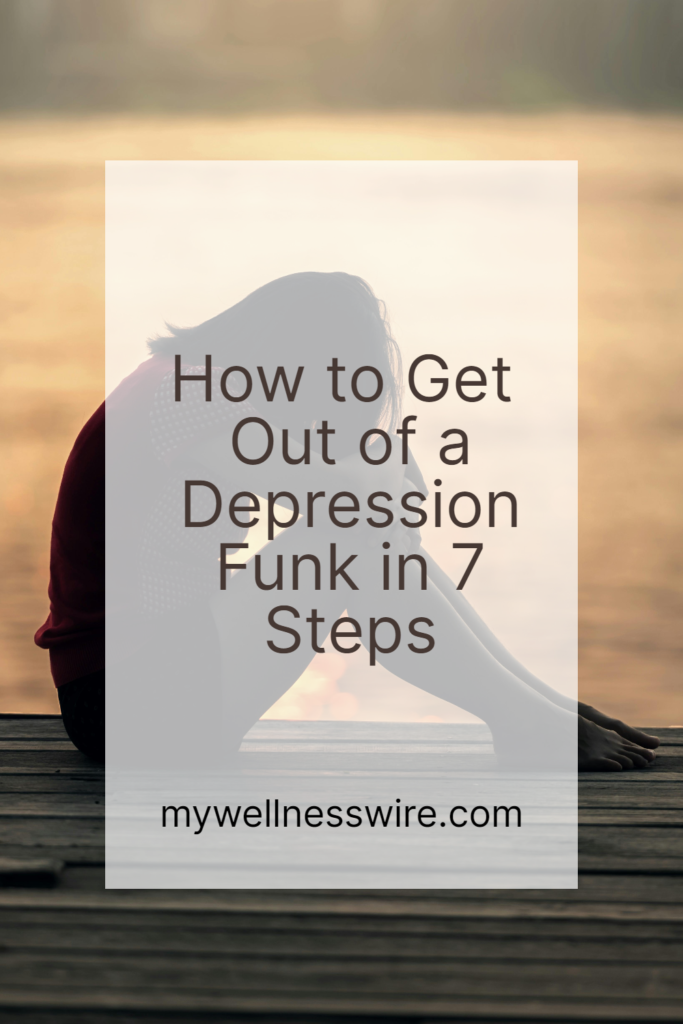
Intro
Navigating through the heavy fog of depression can feel like an insurmountable challenge. However, breaking free and finding light again is not just a distant dream. If you’ve been wondering how to get out of depression funk, you’re not alone.
With deliberate steps and a dedication to self-care, you can start your journey towards brighter days. This blog post will guide you through seven pivotal steps to help uplift your spirit and break free from the clutches of depression.
Acknowledge Your Feelings
Embracing your emotional state is a crucial initial step in addressing depression.
Often, there’s a tendency to push aside or invalidate our feelings, especially when they are overwhelmingly negative.
This approach, however, can exacerbate the issue, leading to a deeper entanglement in depressive thoughts. Recognizing and validating your emotions is paramount to beginning the healing process.
The WHO says “Depression is different from regular mood changes and feelings about everyday life.“
It’s important to give yourself permission to feel whatever you’re experiencing without judgment.
This acceptance doesn’t mean you’re succumbing to depression; rather, it’s acknowledging that your feelings are a part of your current experience and deserve attention. Journaling serves as an excellent tool for this purpose.
Through writing, you can explore the depths of your feelings, offering a form of release and a chance to delve into the roots of your depression.
This practice can illuminate patterns or triggers that may not be immediately apparent, providing valuable insights into your emotional world.
Additionally, journaling creates a private space for self-expression, allowing you to confront and clarify your emotions in a tangible form. By affirming your feelings, you lay the groundwork for meaningful change and healing, setting the stage for the transformative steps that follow.
Establish a Routine

In the throes of depression, days can blend into one another, leaving you feeling lost and disoriented.
Implementing a structured daily routine is a beacon of light in such times, guiding you towards stability and a sense of control over your life.
Begin with the basics: commit to waking up and retiring to bed at consistent times. This simple act can anchor your day, providing a framework around which to build further activities.
Next, focus on incorporating nutritious meals at regular intervals, ensuring you fuel your body with what it needs to combat the lethargy and lack of motivation that often accompany depression.
Personal hygiene and grooming might feel like monumental tasks, but they are vital components of your routine.
They not only cater to your physical well-being but also boost your self-esteem and sense of personal accomplishment.
As you grow more accustomed to this foundational schedule, gradually introduce additional elements that foster emotional and mental health.
This could include designated times for meditation, reading, or any hobby that brings you joy and satisfaction.
The essence of establishing a routine lies in its ability to carve out a predictable, manageable pattern in your day-to-day life.
This predictability is comforting in the face of depression’s chaos and unpredictability. Remember, the goal isn’t to fill every moment with activity but to create a balanced structure that supports your journey to wellness.
The routine you create should be flexible, allowing for adjustments as your energy and capabilities evolve. Engaging in this process actively participates in your recovery, reminding you of your agency even on the toughest days.
Connect with Others
In the depth of depression, the pull to withdraw from the world around us can be strong. However, forging connections with others plays a crucial role in alleviating the sense of isolation that often accompanies this mental health challenge.
Initiating contact with friends or family members, even through something as simple as a brief message or a phone call, can inject moments of warmth and companionship into your day.
These interactions, though they may seem small, serve as reminders that you are not navigating your journey alone.
Moreover, consider the benefits of participating in support groups. These gatherings offer a unique space where you can share your experiences with individuals who understand the nuances of what you’re going through.
The mutual support found in these groups not only bolsters your own resilience but also enables you to contribute to the healing of others.
This reciprocal exchange of empathy and understanding can significantly enhance your sense of belonging and community.
The act of reaching out and connecting with others can also extend beyond personal networks and support groups.
Engaging in community activities or volunteer work can provide a sense of purpose and fulfillment, further combating the feelings of isolation.
These connections, whether with close loved ones or strangers sharing a common cause, are instrumental in weaving a fabric of support that can hold you up during the toughest times.
By actively seeking and nurturing these connections, you foster an environment ripe for healing and growth.
Get Moving
Incorporating physical activity into your daily life is a transformative step in battling depression.
Engaging in exercise, even at a moderate level, can work wonders for your mental health by stimulating the release of endorphins.
These “feel-good” hormones play a pivotal role in elevating mood and reducing the perception of pain. Starting is often the hardest part, so it’s beneficial to select activities that resonate with you personally.
Whether it’s a leisurely stroll through your neighborhood, joining a yoga class, or letting loose with some dance moves in your living room, the key is to enjoy the process.
This approach ensures that the activity is not only beneficial for your physical health but also something you look forward to, making it a sustainable part of your recovery journey.
Additionally, the act of moving your body can serve as a mindful escape from the cyclic patterns of depressive thoughts. It provides a focus outside of the mental loops that can often dominate your headspace.
By directing your attention to the physical sensations and the rhythm of your movements, you engage in a form of mindfulness that can be incredibly soothing and grounding.
It’s also worth noting the social aspect of certain physical activities. Joining a class or group for exercise can introduce a communal element to your routine, offering additional support and motivation.
Engaging in shared activities can enhance your sense of connection and belonging, further enriching the healing process.
Remember, the goal isn’t perfection or performance; it’s about finding joy and comfort in the movement of your body.
Each step, stretch, or dance move is a step away from the grip of depression, making physical activity a vital ally on your path to recovery.
Seek Sunlight and Nature
Embracing the outdoors has a profound effect on elevating one’s mood and combating depression. The infusion of sunlight into your daily routine works wonders by enhancing your Vitamin D intake, which is essential for mood regulation and overall well-being.
Aim to integrate outdoor activities into your life, whether it’s a morning ritual of sipping your coffee in the garden or taking your exercise routine outside.
The direct contact with sunlight not only revitalizes your spirit but also helps synchronize your body’s circadian rhythm, improving sleep patterns and energy levels throughout the day.
Venturing into natural settings amplifies these benefits. Green spaces offer an unparalleled sense of peace and renewal.
The sights, sounds, and smells of nature—be it a lush forest, a serene park, or a tranquil beach—serve to ground you in the present moment, reducing stress and anxiety.
Engaging with nature can be as simple as tending to a garden, hiking on a trail, or even just observing the beauty around you during a leisurely walk.
These activities provide a much-needed escape from the confines of indoor life, fostering a deep connection with the external world that can be incredibly therapeutic.
Moreover, incorporating nature into your routine encourages mindfulness, a practice that cultivates a focused awareness on the current moment. This mindfulness can be a powerful tool in breaking the cycle of depressive thoughts and feelings.
As you immerse yourself in the beauty and tranquility of natural surroundings, you open up a space for healing and reflection, allowing you to reconnect with yourself and the environment in a meaningful way.
Experiment with Supplements

Navigating the realm of supplements can offer additional support in managing depression.
Among the variety of options, Omega-3 fatty acids stand out for their role in brain health, potentially easing symptoms of depression by promoting better brain function.
Vitamin D, often dubbed the ‘sunshine vitamin,’ can also play a crucial role, especially for individuals with limited exposure to natural sunlight, by impacting mood regulation.
B vitamins, particularly B12 and folate, are vital for neurological function and energy production, deficiencies of which have been linked to depression.
Before incorporating any supplements into your regimen, a discussion with a healthcare provider is essential.
This step ensures the integration of supplements is tailored to your unique health profile, considering any existing conditions or medications that could interact with new supplements.
A professional can guide you on appropriate types and dosages, providing a tailored approach to supplement use.
Additionally, exploring supplements like Magnesium, known for its calming effects on the nervous system, or St. John’s Wort, a herb used for centuries for mood disorders, may offer further avenues for relief.
However, the use of St. John’s Wort, in particular, requires caution due to its potential to interfere with several medications, highlighting the importance of professional oversight.
Engaging in this exploration should be viewed as part of a broader strategy for managing depression, complementing other lifestyle changes and treatments.
While supplements can offer support, they work best when combined with other efforts such as therapy, physical activity, and nutritional adjustments.
By taking a holistic approach to your well-being, including the judicious use of supplements, you are taking affirmative steps towards alleviating the symptoms of depression and improving your overall mental health.
Seek Professional Help
Embarking on a journey out of the depths of depression often necessitates more than individual efforts.
Reaching out to a mental health professional can provide a lifeline during these challenging times.
Therapists, psychologists, and psychiatrists are equipped with the expertise to guide you through the maze of your emotions, offering insights and tools that are invaluable in your healing process.
They work collaboratively with you to tailor coping strategies that address your specific needs, setting a foundation for lasting recovery.
Professional support can take various forms, from traditional talk therapy sessions that help unpack the underlying causes of your depression to cognitive-behavioral therapy (CBT) that focuses on altering negative thought patterns and behaviors.
For some, medication prescribed by a psychiatrist may be a critical component of their treatment plan, offering chemical support to navigate through the fog of depression more effectively.
It’s crucial to understand that enlisting the help of a mental health professional is a step towards empowerment. It’s about taking control of your mental health and actively seeking out solutions that facilitate a return to wellness.
There’s no one-size-fits-all solution when it comes to treating depression, and a professional can offer the personalized guidance necessary to find the most effective path forward for you.
The decision to seek professional help is a profound act of self-care. It reflects a commitment to improving your quality of life and underscores the importance of mental health in overall well-being. In doing so, you affirm that you deserve support, compassion, and a future free from the grip of depression.
Pin this post to read later




Thank you for your sharing. I am worried that I lack creative ideas. It is your article that makes me full of hope. Thank you. But, I have a question, can you help me?